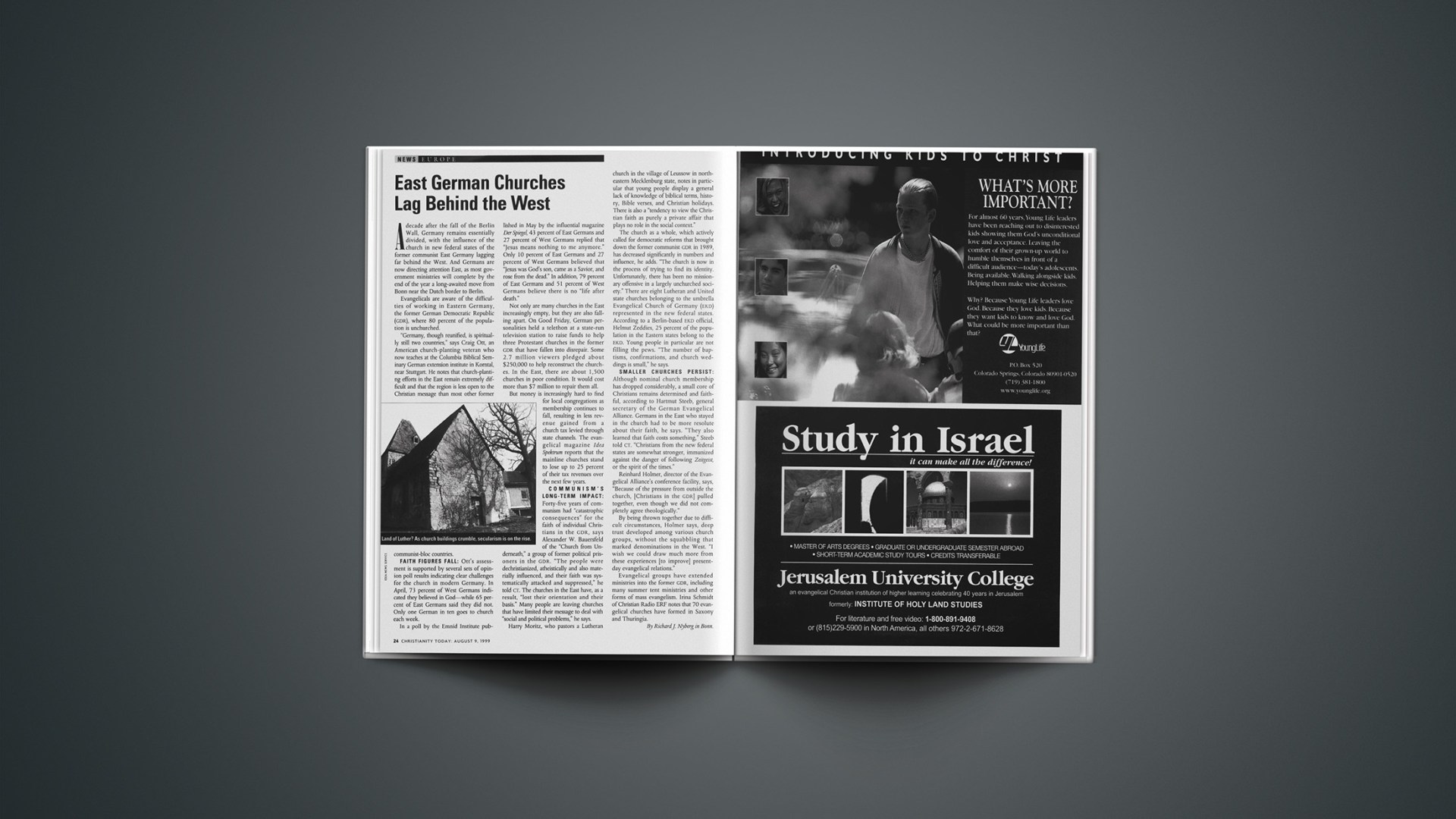A decade after the fall of the Berlin Wall, Germany remains essentially divided, with the influence of the church in new federal states of the former communist East Germany lagging far behind the West. And Germans are now directing attention East, as most government ministries will complete by the end of the year a long-awaited move from Bonn near the Dutch border to Berlin.
Evangelicals are aware of the difficulties of working in Eastern Germany, the former German Democratic Republic (GDR), where 80 percent of the population is unchurched.
“Germany, though reunified, is spiritually still two countries,” says Craig Ott, an American church-planting veteran who now teaches at the Columbia Biblical Seminary German extension institute in Korntal, near Stuttgart. He notes that church-planting efforts in the East remain extremely difficult and that the region is less open to the Christian message than most other former communist-bloc countries.
FAITH FIGURES FALL: Ott’s assessment is supported by several sets of opinion poll results indicating clear challenges for the church in modern Germany. In April, 73 percent of West Germans indicated they believed in God—while 65 percent of East Germans said they did not. Only one German in ten goes to church each week.
In a poll by the Emnid Institute published in May by the influential magazine Der Spiegel, 43 percent of East Germans and 27 percent of West Germans replied that “Jesus means nothing to me anymore.” Only 10 percent of East Germans and 27 percent of West Germans believed that “Jesus was God’s son, came as a Savior, and rose from the dead.” In addition, 79 percent of East Germans and 51 percent of West Germans believe there is no “life after death.”
Not only are many churches in the East increasingly empty, but they are also falling apart. On Good Friday, German personalities held a telethon at a state-run television station to raise funds to help three Protestant churches in the former GDR that have fallen into disrepair. Some 2.7 million viewers pledged about $250,000 to help reconstruct the churches. In the East, there are about 1,500 churches in poor condition. It would cost more than $7 million to repair them all.
But money is increasingly hard to find for local congregations as membership continues to fall, resulting in less revenue gained from a church tax levied through state channels. The evangelical magazine Idea Spektrum reports that the mainline churches stand to lose up to 25 percent of their tax revenues over the next few years.
COMMUNISM’S LONG-TERM IMPACT: Forty-five years of communism had “catastrophic consequences” for the faith of individual Christians in the GDR, says Alexander W. Bauersfeld of the “Church from Underneath,” a group of former political prisoners in the GDR. “The people were dechristianized, atheistically and also materially influenced, and their faith was systematically attacked and suppressed,” he told CT. The churches in the East have, as a result, “lost their orientation and their basis.” Many people are leaving churches that have limited their message to deal with “social and political problems,” he says.
Harry Moritz, who pastors a Lutheran church in the village of Leussow in northeastern Mecklenburg state, notes in particular that young people display a general lack of knowledge of biblical terms, history, Bible verses, and Christian holidays. There is also a “tendency to view the Christian faith as purely a private affair that plays no role in the social context.”
The church as a whole, which actively called for democratic reforms that brought down the former communist GDR in 1989, has decreased significantly in numbers and influence, he adds. “The church is now in the process of trying to find its identity. Unfortunately, there has been no missionary offensive in a largely unchurched society.” There are eight Lutheran and United state churches belonging to the umbrella Evangelical Church of Germany (EKD) represented in the new federal states. According to a Berlin-based EKD official, Helmut Zeddies, 25 percent of the population in the Eastern states belong to the EKD. Young people in particular are not filling the pews. “The number of baptisms, confirmations, and church weddings is small,” he says.
SMALLER CHURCHES PERSIST: Although nominal church membership has dropped considerably, a small core of Christians remains determined and faithful, according to Hartmut Steeb, general secretary of the German Evangelical Alliance. Germans in the East who stayed in the church had to be more resolute about their faith, he says. “They also learned that faith costs something,” Steeb told CT. “Christians from the new federal states are somewhat stronger, immunized against the danger of following Zeitgeist, or the spirit of the times.”
Reinhard Holmer, director of the Evangelical Alliance’s conference facility, says, “Because of the pressure from outside the church, [Christians in the GDR] pulled together, even though we did not completely agree theologically.”
By being thrown together due to difficult circumstances, Holmer says, deep trust developed among various church groups, without the squabbling that marked denominations in the West. “I wish we could draw much more from these experiences [to improve] present-day evangelical relations.”
Evangelical groups have extended ministries into the former GDR, including many summer tent ministries and other forms of mass evangelism. Irina Schmidt of Christian Radio ERF notes that 70 evangelical churches have formed in Saxony and Thuringia.
Copyright © 1999 Christianity Today. Click for reprint information.










